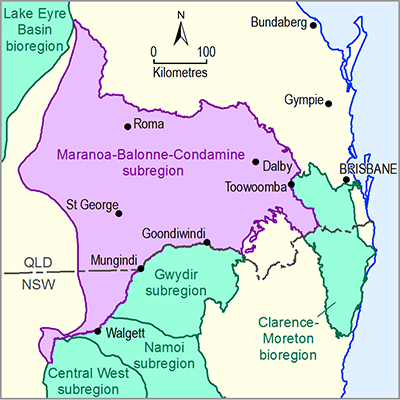Groundwater planning and management is undertaken by the Queensland Government via water resource plans. The Queensland water resource plans are subordinate legislation under the Water Act 2000 (Queensland), prepared at a river basin scale, and they specify the outcomes and strategies that will be used for each plan area. They expire after ten years unless they have been formally extended. Groundwater is currently not managed under the three Queensland water resource plans in the bioregion, it is in the main, managed under state regulations. Groundwater resources of the GAB in Queensland are managed through the Great Artesian Basin water resource plan. The Queensland Government manages non-GAB groundwater extraction limits by limiting the volume of entitlement that is made available in a plan area (plan limit). In areas where overuse is an issue (e.g. Upper Condamine Alluvium), an announced entitlement process is used to manage overuse and other impacts. Water resource plans lead to the development of resource operation plans, which implement the outcomes and strategies specified in the water resource plan.
The groundwater systems within the bioregion (excluding those of the GAB) are also represented in the Basin Plan for the Murray–Darling Basin as sustainable diversion limit (SDL) resource units. Relevant NSW and Queensland water sharing plans within the Maranoa-Balonne-Condamine subregion are listed in Table 9, and aligned with corresponding SDL resource units of the Basin Plan. The Queensland water resource plans of interest are the Border Rivers, Condamine and Balonne, and Moonie River plans. These currently do not include the management of the groundwater resources. Current limits under existing planning regimes and future extraction limits for these groundwater systems are prescribed within the Basin Plan as baseline diversion limits (BDLs) and SDLs (Basin Plan 2012).
Groundwater extraction and use varies significantly between the groundwater systems in terms of volumes extracted, extraction as a proportion of estimated limits, and actual water use. Current entitlement levels, entitlement limits and recent annual extraction estimates are provided for each groundwater system in Table 10. It should be noted that a number of sustainable diversion limit resource units extend beyond the boundary of the subregion. In such cases the baseline diversion limit and sustainable diversion limits values are representative of an area greater than that which falls within the subregion.
The Sediments above the Great Artesian Basin: Warrego-Paroo-Nebine and the Upper Condamine Basalt aquifers have the greatest sustainable diversion limits for the area (99.2 and 79.0 GL/year respectively). These, however, only comprise a small portion of the subregion. The NSW Government (2010) indicates that there is consultation between NSW and Queensland on the management of the Border Rivers Alluvium.
Groundwater extraction from the GAB is largely for stock and domestic use, and has been historically elevated by uncontrolled flow from artesian bores. This issue has been progressively addressed by programs such as the Great Artesian Basin Sustainability Initiative, which commenced in 1999. As of July 2012, 256 bores in the NSW Surat Basin had been controlled under the Great Artesian Basin Sustainability Initiative and previous programs, with estimated water savings of 50,037 ML/year (Great Artesian Basin Coordinating Committee, 2011). Within the Queensland Surat management zone 44 out of 54 uncontrolled bores have been rehabilitated and over 5000km of bore drains have been replaced by pipes and troughs, under the Great Artesian Basin Sustainability Initiative and its predecessors. Estimated water savings are in the order of 24,500 ML, which equates to over 90% of the potential losses prior to implementation of the rehabilitation schemes (C Walton (DNRM), 2014, pers. comm.)
Table 9 Comparison of groundwater extraction limits in water resource plans, water sharing plans and the Commonwealth’s Basin Plan 2012
aThese are long-term average annual net recharge estimates. Annual extraction limits are calculated from these figures by subtracting the volume of planned environmental water – refer to the Water Sharing Plan for the NSW Great Artesian Basin Groundwater Sources 2008.bThe Basin Plan sustainable diversion limit resource unit occurs across two water resource plans, but the correlation in the table is shown with the with the largest overlapping areascSDL = sustainable diversion limit; BDL = baseline diversion limit. Where a separate value is not shown for a BDL for a sustainable diversion limit resource unit, BDL=SDLdSDL resource unit extends beyond the subregion boundary
Table 10 Groundwater entitlements and extraction
Source data: MDBA (2012a) and the MDBA (2012) n/a = not applicableaRecent annual extraction includes metered extraction volumes from licensed bores, and estimated extraction from authorised stock and domestic bores reported in MDBA (2012a).bBaseline diversion limits represent the Murray–Darling Basin Authority’s determination of the limits on groundwater use under existing water management arrangements.cLong-term average sustainable diversion limits come into effect in 2019dSDL resource unit extends beyond subregion boundary.

